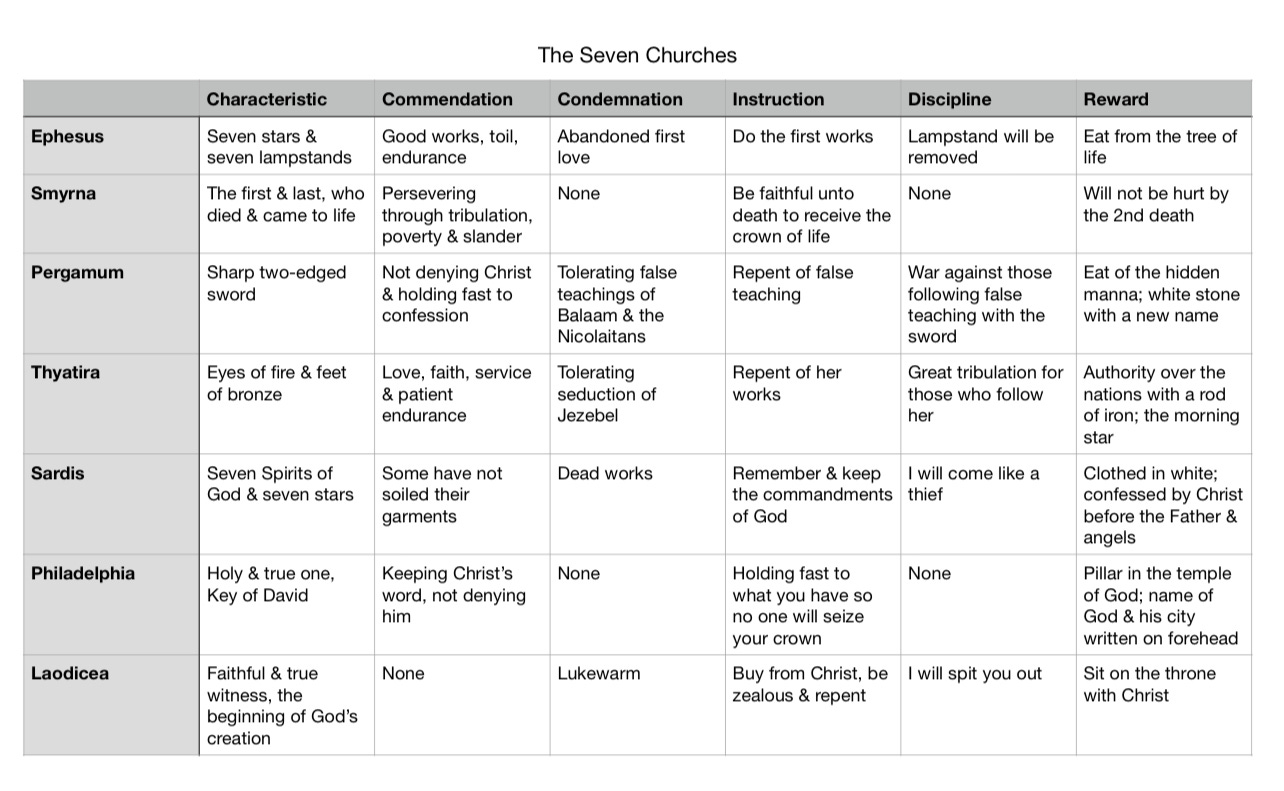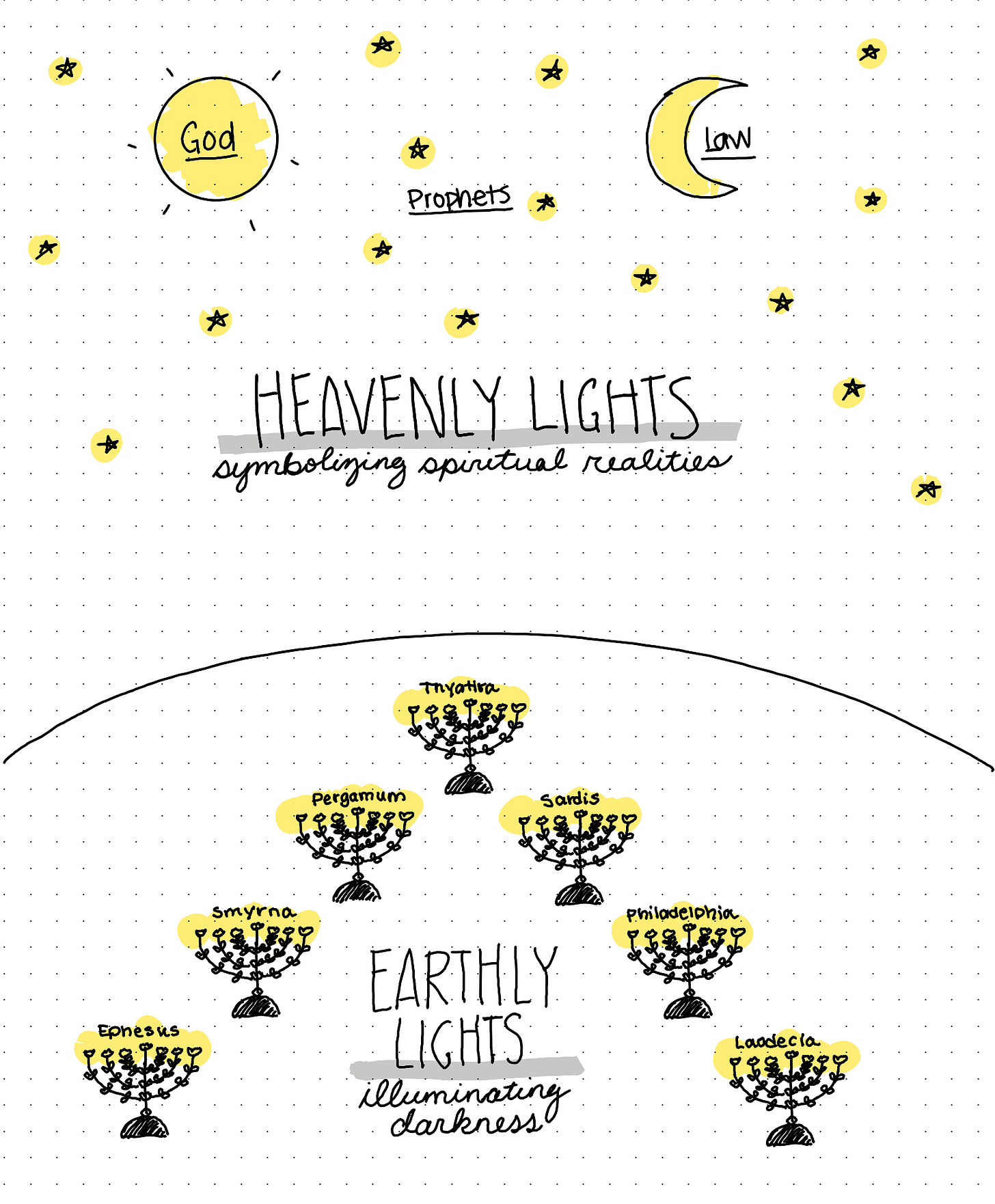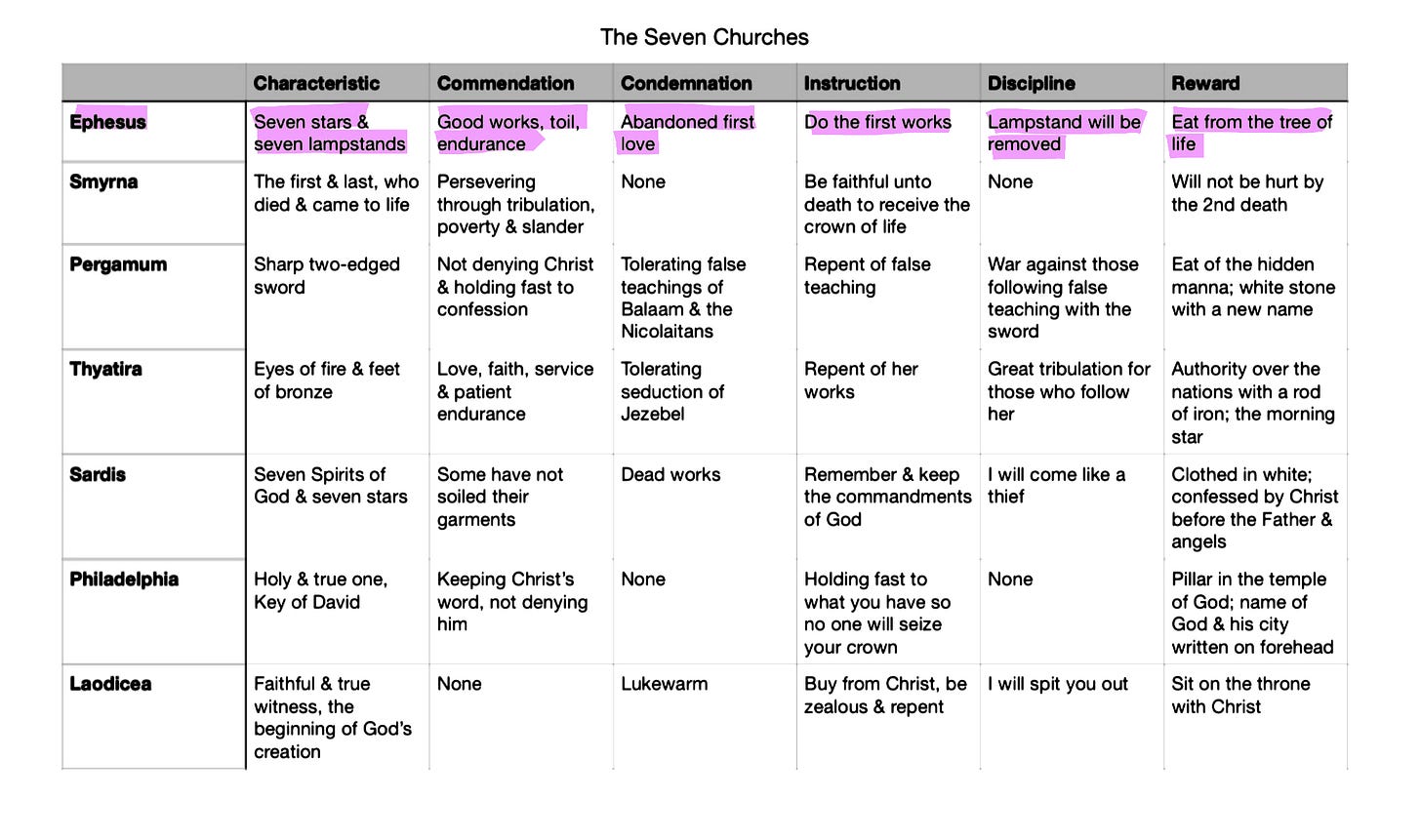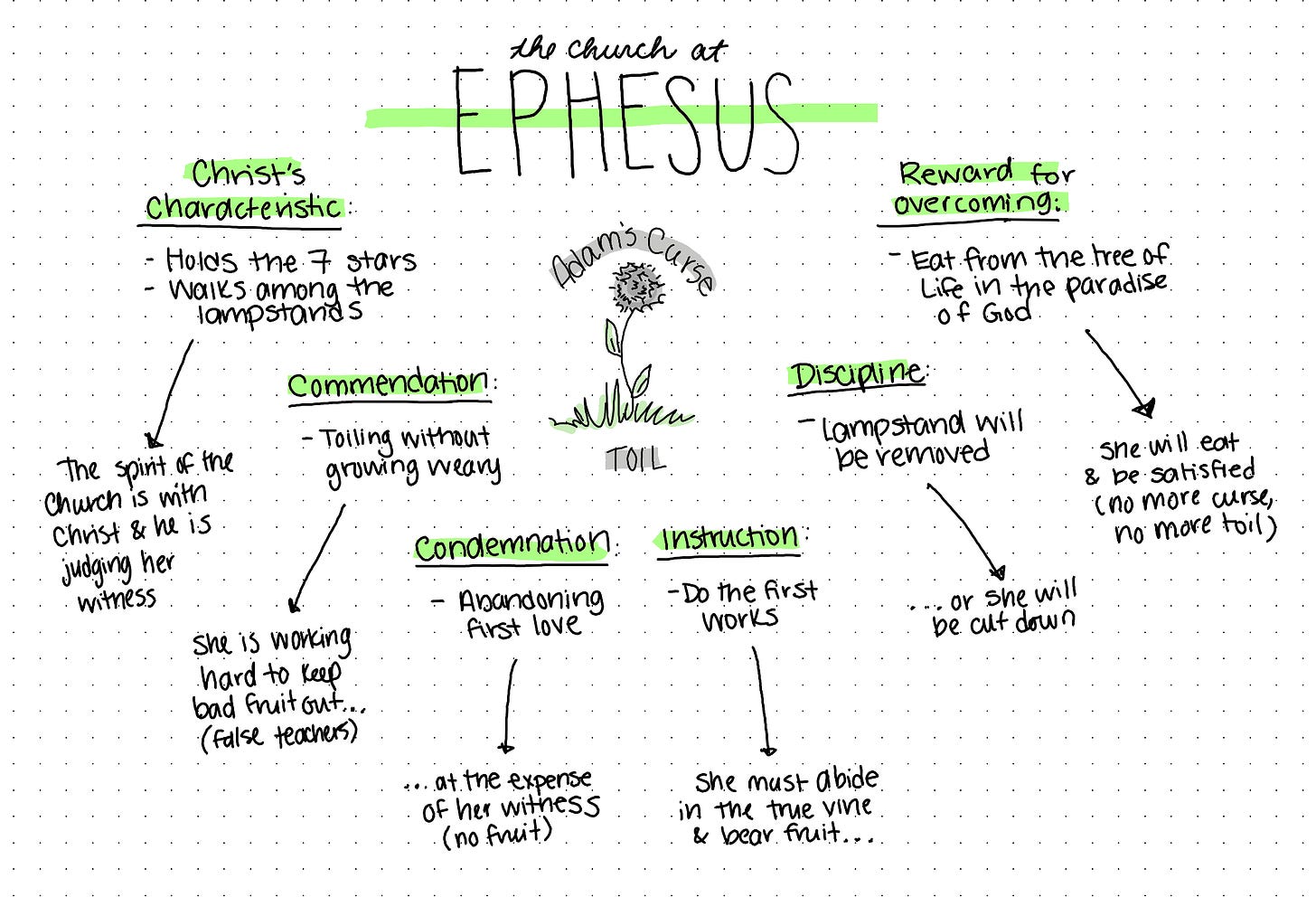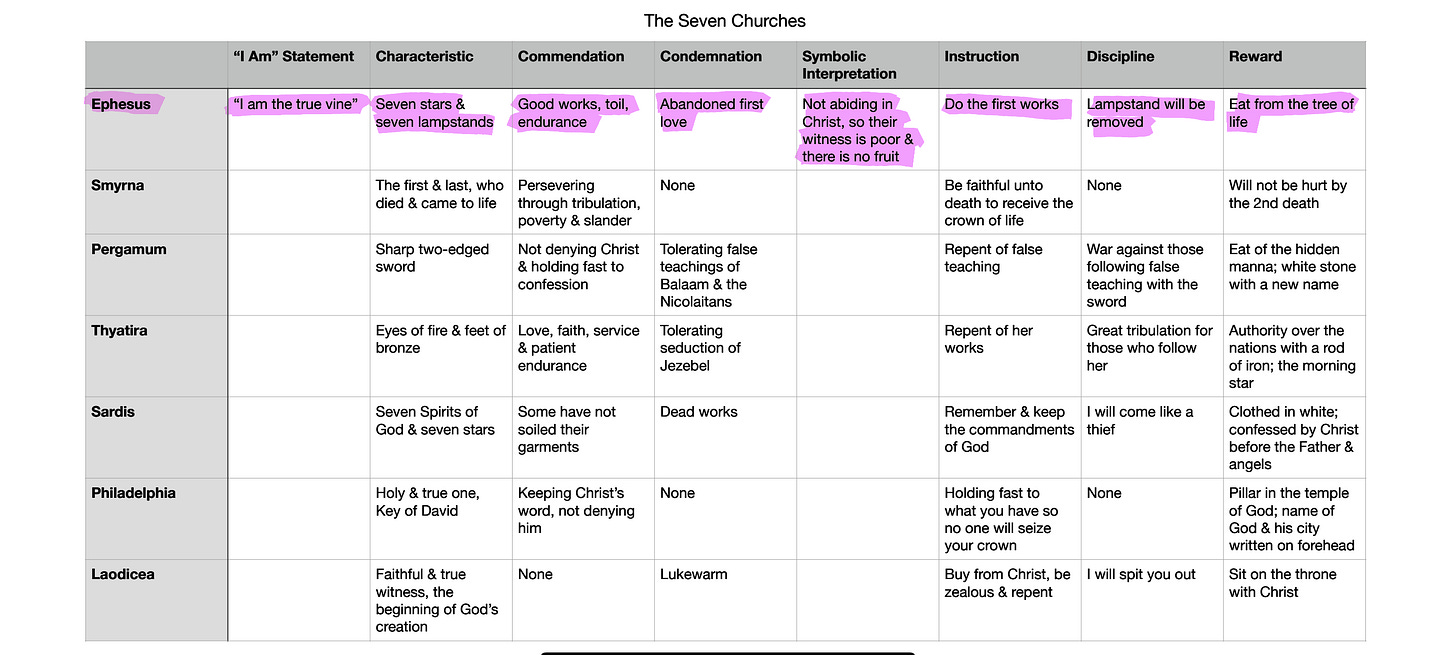(Note: All the footnotes are references to more scriptures that will aid in meditating further on the theme of this post but did not fit well anywhere in the narrative.)
Of all the strange and interesting parts of Revelation, you may be tempted to skip the letters to the seven churches. On the other hand, this may be the only part of Revelation you have studied in depth because it feels like the only relevant and decipherable part of this cryptic book. If you relate to the former, I promise you there is much more to these letters than what is plainly stated. The symbolism in these letters is as expansive as any other part of Revelation. If you relate to the latter, I can assure you there will be some parallels and cross references in this section that you have probably never thought of before.
In either case, I urge you with the same words Christ repeats throughout these letters: He who has an ear, let him hear what the Spirit says to the churches.
The Organization of The Letters
There are several angles from which I want to address the seven letters—all too much to include in one article or podcast. So, here is an overview of how I intend to organize this portion of the series.
The Basic Components
First, I’m going to start with a chart of the basic components included in each letter. This aspect is very straightforward, so I won’t spend much time reiterating the applications that are readily deduced by a cursory reading of each letter.
The Symbolic Allusions
Second, I am going to tease out the symbolism in each letter and show you how it connects to the first chapter of Revelation, the Old Testament, Jesus’ ministry, and the New Testament epistles. And how the seven letters pair beautifully with another very important set of seven in scripture.
The Chiastic Structure
Finally, at the end of all seven letters, I’m going to draw out the chiastic structure of the text to show you how these letters not only weave together the whole of scripture and tell the story of our redemption individually, but how they all together testify in a way that a book written by mere man could not possibly achieve.
And that is my goal as I write this to you. By the end of this very lengthy exposition I hope to prove to you that these letters tell an impossible story—not only by what is said in these passages, but by what is not said—at least not on this page of scripture; that by their very structure they testify. And by proving this, I hope your faith will be increased by the knowledge that no man could have put this together, and, in turn, you will be compelled to bear witness to what you’ve seen: the Christ.
Speaking of seeing Christ, I do not recommend listening to the podcast only for this portion of Revelation. The included visuals will be essential. I have written extensively on the symbolism in Revelation 1 and nearly all of that will be referenced going forward. Everything unpacked up to this point will be our working vocabulary for the remainder of book with more to be added. If you have not read the previous 9 parts I’ve written on Revelation leading up to this, I recommend reviewing those first. Maybe even making a short list of the interpretation of each symbol up to this point.
With that, here we go!
The Basic Components of the Seven Letters
Each letter contains one emphasized characteristic of Christ, a commendation, a condemnation, instruction, a disciplinary action, and a reward. Here is a chart outlining these components:
I made this chart myself, but I have no doubt you have seen identical charts that list these components. You have heard sermons on the history of these cities and various applications as you assess your own Christian life against the caricatures of these churches. As I said, the familiarity can make this portion of Revelation appear the least provocative in the book.
The Attributes of Christ
The first thing you may notice is that all of the symbols applied to Christ in Revelation 1 are recounted here. A different symbol (and its corresponding characteristic) is mentioned in the greeting of each letter, except the depiction of Christ’s voice sounding like the roar of many waters. (We could probably make an argument for why that is not mentioned, drawing from my previous exposition on water in On The Meaning of Clouds, but it isn’t relevant at the moment.)
We are reminded of these attributes of Christ to not only call our attention back to his full expression of these attributes, but to call attention to how each church relates to that particular attribute.
Each individual church is either expressing or failing to express different attributes of Christ; this is one way we read these letters in a very straightforward manner. However, the number of letters itself has a symbolic interpretation; The fact that there are seven (when there were obviously more churches at the time) indicates that there is an overarching completeness to this set of letters. They do not only represent the individual churches receiving the letters, but together they represent the universal church. And, further, they represent the various spiritual states of each individual Christian.
The Fullness & the Failure
Because the church is in Christ and Christ is in the church, we are one flesh with him. As one flesh there ought to be a perfect reflection of these attributes of Christ in us—the conduct of the church and our individual conduct should match the conduct of Christ. We know that it doesn’t. While he expresses the fullness of what it means to be light, to be salt, to be perfect as God is perfect (Matt. 5:48), all these things we are commanded to be, we fail. Yet, as we read these letters that apply as much to the universal church and our individual lives as they did to the churches they were delivered to, we should be encouraged that instruction and discipline are part of each letter—meaning that all who hear these words of Christ are being treated as children of God (Heb. 12:6).
Our failure is not our death sentence if we heed his instruction and discipline. That brings us to our first letter.
The Church in Ephesus
“To the angel of the church in Ephesus write: ‘The words of him who holds the seven stars in his right hand, who walks among the seven golden lampstands.” - Rev. 2:1
The One Holding the Stars & Walking Among Lampstands
The greeting of this letter highlights Christ as the one holding the seven stars and walking among the lampstands. We have not covered lamps or lampstands specifically yet, but we have covered stars and fire. (You can review those in Revelation 1, parts 9 (stars) and 8 (fire): This Little Light of Mine and And God Saw.)
To summarize, the sun represents God, the moon represents his law as it was dispensed in the Old Testament, and the stars represent the people of God—specifically, the prophets. (In the New Covenant, we are all prophets speaking to the world what God has said in his Word.) The stars are the church represented in the heavenly realm.
When we pivot to the earth, the light source is fire, which is contained in lamps. Both the heavenly lights and the light source on the earth serve to illuminate so that what is hidden may be seen and judged with clarity.
“No one after lighting a lamp puts it in a cellar or under a basket, but on a stand, so that those who enter may see the light.” - Luke 11:33
Light denotes witness. When you are full of the Holy Spirit you both have the clarity to see and judge righteously (to witness in the sense of seeing) and act as a vessel through which the light shines (to witness in the sense of giving evidence of something).
While we tend to operate as wandering stars and cracked vessels, Christ is both of these things perfectly. He’s exposing and judging by the light of his word all that is happening in his church.
Now, having reviewed all of that, light is not actually the theme of this letter to Ephesus. The theme is what results from the light: fruit.
Toil & Trouble
Christ commends the Ephesians for their toil—a word that takes us all the way back to the garden.
“To Adam he said, ‘Because you listened to your wife and ate the fruit from the tree about which I commanded you, ‘You must not eat from it,’ cursed is the ground because of you; through painful toil you will eat food from it all the days of your life.” - Genesis 3:17
Toiling isn’t someone just clipping rose bushes. No, that’s tending. That’s what was lost in the garden. This is really breaking a sweat to survive. And it’s how the Ephesians were unwittingly spending their time.
‘I know your works, your toil and your patient endurance, and how you cannot bear with those who are evil, but have tested those who call themselves apostles and are not, and found them to be false. I know you are enduring patiently and bearing up for my name’s sake, and you have not grown weary.” - Rev. 2:2-3
It sounds like the Ephesians have been reading the sermon on the mount:
“Beware of false prophets, who come to you in sheep’s clothing but inwardly are ravenous wolves. You will recognize them by their fruits. Are grapes gathered from thorn bushes or figs from thistles? So every healthy tree cannot bear bad fruit, nor can a diseased tree bear good fruit. Every tree that does not bear good fruit is cut down and thrown into the fire. Thus you will recognize them by their fruits.” - Matthew 7:15-20
Note that the Ephesians are really toiling over false teaching and purging the church. They can see the bad fruit of false apostles, but they are failing to recognize their own lack of fruit. Good fruit means both the good works of an individual and the growth of the church among the nations. Bad fruit means false works of an individual and false converts.
The Cursed Fig Tree
Consider another tree named in scripture:
“On the following day, when they came from Bethany, he was hungry. And seeing in the distance a fig tree in leaf, he went to see if he could find anything on it. When he came to it, he found nothing but leaves, for it was not the season for figs. And he said to it, “May no one ever eat fruit from you again.” - Mark 11:12-14
Jesus didn’t curse the fig tree for having bad fruit—he cursed it for having no fruit. It fed nobody.
The problem is that working solely to get rid of the bad fruit is not enough to be a faithful witness. That’s baseline, that’s just your get out of hell free card—if it were even possible to get all of the bad fruit out. But suppose you were to achieve purging all the bad fruit from the church and from your spiritual life. Then what?
Toiling to get the bad out is a universal experience and it produces a poor witness to the outside world of what life in Christ is really all about. Sure, the church is theologically sound, but it’s no good to have good theology and no fruit to show for it.1
“Be ashamed, O tillers of the soil; wail, O vinedressers, for the wheat and the barley, because the harvest of the field has perished. The vine dries up; the fig tree languishes. Pomegranate, palm, apple, all the trees of the field are dried up, and gladness dries up from the children of man.” - Joel 1:11-12
Cut Down
The next day the disciples found that same tree and noticed that it had withered. Jesus also told a similar parable in Luke 13:6-9 of a fig tree that bore no fruit and was under threat of being cut down if it was found in the same state the following year.
John the Baptist used the same language rebuking the Pharisees in Matthew 3:7-10.
It’s the same disciplinary threat the Ephesians are under when Christ says:
“If not, I will come to you and remove your lampstand from its place, unless you repent.” - Revelation 2:5b
If you aren’t bearing fruit, you’ll be cut down and burned. If you aren’t shining the light, there’s no use in a lampstand.
Bearing Fruit in Keeping With Repentance
But taking a step backward, what exactly are the Ephesians commanded to repent of? The result is a barren tree and a poor witness, but let’s back up a bit:
“But I have this against you, that you have abandoned the love you had at first. Remember therefore from where you have fallen; repent, and do the works you did at first.” - Revelation 2:4-5a
And look at this word calling us back again: fallen.
What does it mean that they abandoned their first love? Does that mean they forgot Christ altogether? No, they were obviously working hard to please him.
In reality, the Ephesians forgot how they loved at first. Love does not consist in merely subtracting undesirable qualities. It consists of adding what is desirable.
Too often we reduce our religion to a list of things to avoid. Talk to any Roman Catholic and you’ll see a religion of endless rules regarding the things we must remove from our lives to achieve personal holiness. But true Christian love sets us free to bear good fruit.
What is good fruit?
“If you love me, you will keep my commandments.” - John 14:15
And one of them, a lawyer, asked him a question to test him. “Teacher, which is the great commandment in the Law?” And he said to him, “You shall love the Lord your God with all your heart and with all your soul and with all your mind. This is the great and first commandment. And a second is like it: You shall love your neighbor as yourself. On these two commandments depend all the Law and the Prophets.” - Matthew 22:35-40
“Owe no one anything, except to love each other, for the one who loves another has fulfilled the law.” - Romans 13:8
The greatest way that we love God is loving others. And the greatest way we love others is to bear witness of Him.
“In the same way, let your light shine before others, so that they may see your good works and give glory to your Father who is in heaven.” - Matthew 5:16
Within the church, this means doing good to one another in the plethora of ways described in the epistles—like Ephesians!
How do we make God known to the world?
Tell them.
“The fruit of the righteous is a tree of life, and whoever captures souls is wise.” - Proverbs 11:30
This is what the Ephesians forgot. Tell them with your life, with your love for the brethren, with your words, and, yes, even with your purging of bad fruit. But there won’t be any fruit in your life and the church will not increase if you are too busy navel-gazing at what all is wrong with you and wrong in your church. Do we not trust that God is sovereign to purify his people? To purify us?
Eat & Be Satisfied
Finally, the letter concludes with the promise of reward for the repentant:
“To the one who conquers I will grant to eat of the tree of life, which is in the paradise of God.’” - Revelation 2:7b
Even in the conclusion we are brought back into the garden, where the choice to toil instead of rest was made.
“I Am the True Vine”
This brings us to the other set of seven that pairs so beautifully with the seven letters. I wonder if you’ve seen it before now—the title of this article was your hint. These letters perfectly align with the seven “I Am” statements of Jesus recorded in John’s gospel. For every failure in his church, Christ answers with his fullness.2
(Let’s add a couple more columns to our chart:)
So how does Christ answer the plight of the church at Ephesus? More importantly, how does he answer our tendency to toil in vain?3
With a vine:
“I am the true vine, and my Father is the vinedresser. Every branch in me that does not bear fruit he takes away, and every branch that does bear fruit he prunes, that it may bear more fruit. Already you are clean because of the word that I have spoken to you. Abide in me, and I in you. As the branch cannot bear fruit by itself, unless it abides in the vine, neither can you, unless you abide in me. I am the vine; you are the branches. Whoever abides in me and I in him, he it is that bears much fruit, for apart from me you can do nothing. If anyone does not abide in me he is thrown away like a branch and withers; and the branches are gathered, thrown into the fire, and burned. If you abide in me, and my words abide in you, ask whatever you wish and it will be done for you. By this my Father is glorified, that you bear much fruit and so prove to be my disciples. As the Father has loved me, so have I loved you. Abide in my love. If you keep my commandments, you will abide in my love, just as I have kept my Father’s commandments and abide in his love. These things I have spoken to you, that my joy may be in you, and that your joy may be full.”
- John 15:1-11
If we are ever to address the problem of a poor witness and a fruitless tree, the only thing we can do is abide. Where strivings cease—in Christ.4
“Oh, taste and see that the Lord is good! Blessed is the man who takes refuge in him!” - Psalm 34:8
(All of my biblical content is free, but if you would like to leave a tip, you can click the link below!)
“He also who had received the one talent came forward, saying, ‘Master, I knew you to be a hard man, reaping where you did not sow, and gathering where you scattered no seed, so I was afraid, and I went and hid your talent in the ground. Here, you have what is yours.’ But his master answered him, ‘You wicked and slothful servant! You knew that I reap where I have not sown and gather where I scattered no seed? Then you ought to have invested my money with the bankers, and at my coming I should have received what was my own with interest. So take the talent from him and give it to him who has the ten talents. For to everyone who has will more be given, and he will have an abundance. But from the one who has not, even what he has will be taken away.” - Matthew 25:24-29
“But this is gain for a land in every way: a king committed to cultivated fields.” - Ecclesiastes 5:9
“There is nothing better for a person than that he should eat and drink and find enjoyment in his toil. This also, I saw is from the hand of God, for apart from him who can eat or who can have enjoyment? For to the one who pleases him God has given wisdom and knowledge and joy, but to the sinner he has given the business of gathering and collecting, only to give to one who pleases God. This also is vanity and a striving after wind.” - Ecclesiastes 2:24-26
“The threshing floors shall be full of grain; the vats shall overflow with wine and oil. I will restore to you the years that the swarming locust has eaten, the hopper, the destroyer, and the cutter, my great army, which I sent among you. You shall eat in plenty and be satisfied, and praise the name of the Lord you God, who has dealt wondrously with you. And my people shall never again be put to shame.” - Joel 2:24-26




